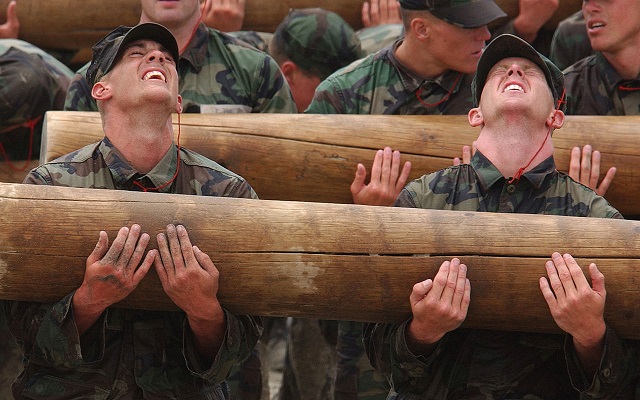
Brotherhood does not mean we agree on every last thing. It doesn’t mean we have to like each other all that much. It means we choose to set aside our differences to serve a cause greater than ourselves. This happens naturally in war. In its most raw form, the cause becomes to stay alive. Our differences become very silly when we’re driving into a gunfight. We commit ourselves to proper teamwork in service to our cause, because the cause is worth it.
Whether combat or competition, we have all experienced the power in proper teamwork and do our best to communicate the concept to our team. Reflecting on my time on the baseball field and the battlefield, I now teach teamwork as the following:
"Teamwork is placing the welfare of the team and teammate before yourself in every decision you make on and off the field, understanding that your decisions affect everyone.”
The definition is simple. Application can be more difficult. Disciplining ourselves to consistently apply a concept is called commitment. In order to motivate an individual to commit to selflessness, we must show the benefit. In the corporate world, this can be difficult dependent upon the reward structure. In athletics it’s easy. We want to win it all and be the best team in the nation. In addition to our collective desire, there are individual benefits to the team-first mind that can help a resistant player understand its power and buy in to our cause.
In the Navy SEAL Teams, while moving through an enemy area we would constantly ask ourselves the following phrase in our minds, "If someone were to shoot at us right now, how will I best support my buddy?" This mindset is how a team works most efficiently. Most of our anxiety comes from concern for our own performance. Through repetitive preparation our body knows what to do. Anxiety interferes with performance and arises out of self-concern whether it be for death or competitive failure.
We must defer our concern to the well being of our teammates. If we are thinking about supporting our buddy, we are not thinking about ourselves. Instead of trying to stop a mistake, we are thinking about how we will give to produce a positive action for our teammate. For example: I'm playing shortstop with runners at first and third…and I think…I hope I make this play to stop the run from scoring. vs. I am going to give my second baseman a perfect feed and turn two. Our mental state is not usually an anxious one when we are concerned for others. In fact, in the SEAL Teams it’s our willingness to give our lives for each other that keeps us alive. This is the power in playing for each other vs. with each other. If we play for anything other than our teammates and our cause, we are then playing for someone else’s validation. It is a never ending road of which you have no control. Eventually your talent will meet adversity, and it will break you. I know, I’ve been there. In contrast, if we honor our intrinsic need to serve a cause, embrace our best and give it to the team…we will then be playing free and in joy for love of each other and love of the game…I’ve been there too. This is our most confident state of mind giving us the best chance to crush our competition.
Just like watching the ball all the way into the glove, the team-first mind is a fundamental choice. We must make it our habit. In adversity we will react in habit. When a grenade rolls out in the middle of your teammates, the choice to jump on it to save your pals is not a decision that is made it the moment. It’s a habitual lifestyle of tremendous reward. Whether it’s your ball club, family, or mankind as we serve our Cause, ask yourself this every morning: What I have I done for my team today? This is the mindset that drives Navy SEALs. It is the mindset of champions. It’s how winning is done and it pays to be a winner.